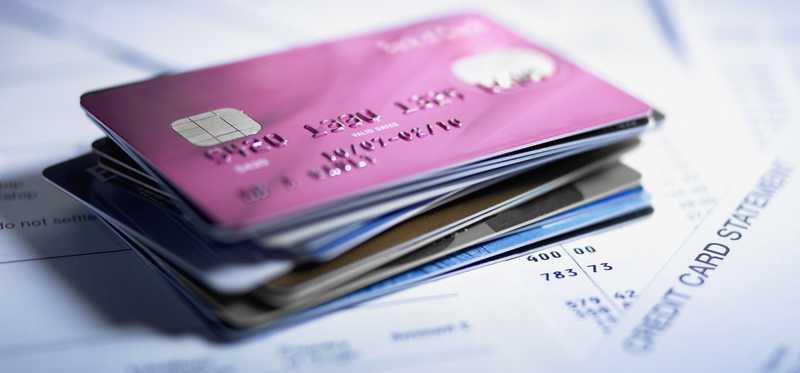15 Ways to Improve Your Credit Score

15 Ways to Improve Your Credit Score
Don't let your credit score get you down
Let’s face it, credit card debt is the proverbial millstone around many a consumer’s neck. According to Experian, American consumers owed roughly $800 billion in credit card debt as of the third quarter of last year.
There are a variety of factors that impact your credit score, but many of them come down to how one manages and pays down debt. And it’s no secret that credit card debt can be a huge detractor to a healthy credit score.
If you’re not in a position to pay down all your existing credit card debt at once, you’re certainly not alone. Thankfully, there are a variety of day-to-day changes you can make starting today that will ultimately help you improve your credit score.
Let’s take a look at 15 ways that you can start improving your credit score right away.
5 Winning Stocks Under $49
We hear it over and over from investors, “I wish I had bought Amazon or Netflix when they were first recommended by the Motley Fool. I’d be sitting on a gold mine!” And it’s true. And while Amazon and Netflix have had a good run, we think these 5 other stocks are screaming buys. And you can buy them now for less than $49 a share! Simply click here to learn how to get your copy of “5 Growth Stocks Under $49” for FREE for a limited time only.
Previous
Next

1. Faithfully pay down the debt you owe
Payment history is the No. 1 factor that impacts your overall credit score. Consistently paying off the debt you owe is key to raising your credit score over the long run. It isn’t just credit card debt that can impact your credit score, either. Other forms of debt such as car loans and personal loans can also impact your credit score, and failure to make timely payments of the amount due on these obligations can quickly bring that score down.
ALSO READ: There's a 100-Point Difference Between 2 of My Credit Scores. Here's Why
Previous
Next

2. Never pay less than the minimum balance owed on your credit card(s)
Just like missing payments will put a major dent in your credit score, so can paying less than the minimum balance owed on your credit card(s). If you’re not in a position to pay off the full balance owed every month as shown on your credit card bill, you should always be sure to make at least the minimum payment required by or before the due date.
Paying even a little higher than the minimum payment requirement can help you get out of debt much sooner, which will in turn help your credit score.
Previous
Next

3. Have fewer credit cards
While some credit card users wield their credit limits responsibly, it’s all too easy to fall into the trap of unnecessarily tapping into multiple available balances and accumulating debt. One way to minimize your likelihood of acquiring excess credit card debt is to simply have fewer credit cards.
For example, let’s say you have several credit cards and you’re close to paying off one card off where you had a history of making late or only the minimum payments on it. Assuming you have other cards at your disposal with which you can continue to work on building your credit and payment history, it may be wise to close that account and cut up the card.
In particular, if you’re someone who struggles with accumulating excess amounts of credit card debt, having fewer credit cards on hand can help you to better manage your spending levels, which can ultimately improve your credit score.
Previous
Next

4. Regularly evaluate your credit report for any discrepancies
There are three primary credit reporting entities in the U.S. -- Equifax, Experian, and TransUnion. As a consumer, you’re allowed to obtain a copy of your credit report at zero cost on an annual basis from any of these three entities. This provides an excellent opportunity to review your credit report. A typical credit report can contain a wide range of information about everything from your credit card accounts to your mortgage, as well as payment histories and outstanding amounts owed.
An error on your credit report (i.e., the wrong account balance) could have a significant impact on your credit score. If you note an error when you receive your free report, it’s important to contact the respective credit reporting entity right away and submit a dispute.
ALSO READ: 1 Big Reason Having a High Credit Score Can Really Pay Off
Previous
Next

5. Curb spending habits
The temptation to spend money is greater than ever before. We live in a time when a constant stream of online advertising entices you to buy more things and to buy them more often. While there's nothing wrong with enjoying your hard-earned money, excess spending can quickly lead you down the path to unnecessary debt. If you’re struggling to get out of credit card debt, it’s never too late to start curbing your spending habits and really taking stock of what expenses you can cut on a weekly and/or monthly basis.
If the urge to spend money on something nonessential hits you, whatever the item is, sleep on it and wait to press the buy button until the next morning. Chances are, if the item is more of an impulse purchase, you’ll be able to think with a clearer head and make better financial decisions after a solid night of sleep.
5 Winning Stocks Under $49
We hear it over and over from investors, “I wish I had bought Amazon or Netflix when they were first recommended by the Motley Fool. I’d be sitting on a gold mine!” And it’s true. And while Amazon and Netflix have had a good run, we think these 5 other stocks are screaming buys. And you can buy them now for less than $49 a share! Simply click here to learn how to get your copy of “5 Growth Stocks Under $49” for FREE for a limited time only.
Previous
Next

6. Always make credit card payments on or before the due date
Remember, your payment history is the most crucial factor that impacts your credit score. In fact, your payment history constitutes a whopping 35% of your FICO score. So, a series of late payments can quickly tank your credit score.
Previous
Next

7. See if you can work out a plan with your credit card company
If you find yourself in a position where your current credit card debt amount seems insurmountable and you’re struggling to keep your head above water, it might be possible to negotiate an individualized plan with your credit card company. Bear in mind, it’s always optimal to pay down your debt in full rather than resort to seeking a lump settlement or other agreement with your card issuer, as these options will almost certainly impact the health of your credit score in the near term.
That being said, if your options to repay your current credit card debt are limited, negotiating and fulfilling a payment plan or settlement agreement with your credit card company could be a viable option. Not only will doing so help you get back on your feet financially but you can start working on breathing life back into your credit score once your obligations under the arranged plan have been met.
ALSO READ: 3 Things I'm Doing This Year to Protect My Credit Score
Previous
Next

8. Formulate a personal debt reduction strategy and stick to it
If you owe debt on multiple credit cards and are unable to pay down the full balances due on each card right away (which is the preferable option), consider prioritizing larger payments on high-interest debt first. Even when you can’t pay the full balance due on each card, you should still always ensure that you cover at least the minimum balance or higher every month.
Previous
Next

9. Create a monthly budget
Creating a budget can help you assess recurring expenses, track your savings goals, and evaluate other expenditures, so you can keep a clear view of not only where your money is going but also the areas where you can potentially reduce your outlay.
Budgeting also enables you to more effectively manage all forms of debt repayment, be it from credit cards or otherwise, and can therefore be instrumental in your overall journey to building better credit.
Previous
Next

10. Think long and hard before taking out any new personal loans
There are many types of personal loans, and they can have a multipronged impact on your credit score. Some personal loans can actually enable you to consolidate various forms of debt, although minimum credit score requirements and other conditions usually apply.
If you always make payments on your personal loan on time, this can be a viable means of eventually raising your credit score and kicking debt out the door faster. On the flip side, if you take out a personal loan and don’t meet your monthly installment requirements, you can sink yourself into a further quagmire of debt.
Personal loans aren’t for everyone, and it’s always a good idea to think long and hard before acquiring any form of additional debt. If your goal is debt consolidation and you meet certain qualifying factors, there are other potential means of accomplishing this goal that can be completed with a lower rate of interest than you would acquire by taking out a loan.
5 Winning Stocks Under $49
We hear it over and over from investors, “I wish I had bought Amazon or Netflix when they were first recommended by the Motley Fool. I’d be sitting on a gold mine!” And it’s true. And while Amazon and Netflix have had a good run, we think these 5 other stocks are screaming buys. And you can buy them now for less than $49 a share! Simply click here to learn how to get your copy of “5 Growth Stocks Under $49” for FREE for a limited time only.
Previous
Next

11. Evaluate new purchases on a need vs. want basis
If a constant stream of credit card debt is dragging down your credit score, it’s time to start evaluating any and all new purchases and determining where you can scale down. By examining any upcoming expenditures in terms of what you need versus what you want, you can determine where those expenses fit into your monthly budget and what you can cut back.
ALSO READ: I Opened 2 New Cards in 2 Weeks. Here's What Happened to My Credit Score
Previous
Next

12. Hold off on applying for any new credit cards
If you have several credit cards and are struggling to pay existing debt down, it’s probably not advisable to apply for another, separate card simply to open up another line of credit. In fact, it might be best to whittle your card count down to one or two to keep your available credit to a more easily manageable amount that can curb impulse buys.
Previous
Next

13. Consider debt consolidation
We talked briefly about debt consolidation in a previous slide, with a personal loan being one form. However, there are a variety of ways to consolidate your outstanding debt and gradually boost your credit score in the process.
One of the most obvious benefits to consolidating credit card debt into a single loan is that you can streamline and speed up your debt repayment plan.
One of the most optimal options to consolidate credit card debt is to take out a balance transfer credit card. To take this route, you’ll need to meet the issuer’s credit score thresholds for the specific balance transfer card. If you have decent credit to begin with, this can maximize your chances of getting a favorable interest rate that will save you money over the long run in installment payments and reduce any additional outlay as you whittle down debt.
Previous
Next

14. Take stock of your current credit utilization ratio
Another factor that has a tremendous effect on your credit score is your credit utilization ratio. Your credit utilization ratio is your credit card balance divided by your credit card limit, and multiplied by 100.
A credit card utilization ratio that exceeds 30% will put some serious dings on your credit score over time. Simply put, the lower credit card utilization ratio you have, the better. Curbing spending habits and making regular payments on your balance can help to reduce the credit card utilization ratio and gradually improve your credit score.
Previous
Next

15. Make numerous payments each month to pay off debt faster
The old saying “slow but steady wins the race” applies here. If paying down the entire balance on your card or cards isn’t an option right now, consider making multiple smaller payments on your outstanding debt throughout the month.
You can still pay off your debt faster, while cushioning the impact that a single, large monthly payment might have on your budget. Making numerous monthly payments not only helps you get rid of debt quicker but also can lower your credit utilization rate on a month-to-month basis.
5 Winning Stocks Under $49
We hear it over and over from investors, “I wish I had bought Amazon or Netflix when they were first recommended by the Motley Fool. I’d be sitting on a gold mine!” And it’s true. And while Amazon and Netflix have had a good run, we think these 5 other stocks are screaming buys. And you can buy them now for less than $49 a share! Simply click here to learn how to get your copy of “5 Growth Stocks Under $49” for FREE for a limited time only.
Previous
Next

Take it one day at a time
Improving your credit score won’t happen overnight. The good news is that if you’re someone who’s struggling to get out of credit card debt, you can get started on your journey to boosting your credit score right away.
A track record of timely payments and a favorable credit card utilization ratio are the two most crucial factors that can positively impact your credit score. Examine your credit card purchases with a fine-tooth comb and see where you can cut back unnecessary expenditures that impact your utilization ratio. Faithfully keep up with your payments, and try to avoid adding new credit card debt to your existing debt load as much as possible.
Your goal should always be to pay the balance due each month in full, and not just the minimum payment. If you can’t pay the full amount due every month, strive to pay even a little bit more than the minimum payment required to reduce sky-high interest fees and a prolonged carryover of your balance.
With time, patience, commitment, and determination, you can improve your credit score and work toward a brighter financial future.
The Motley Fool has a disclosure policy.
Previous
Next
Invest Smarter with The Motley Fool
Join Over Half a Million Premium Members Receiving…
- New Stock Picks Each Month
- Detailed Analysis of Companies
- Model Portfolios
- Live Streaming During Market Hours
- And Much More
READ MORE
HOW THE MOTLEY FOOL CAN HELP YOU
-
Premium Investing Guidance
Market beating stocks from our award-winning service
-
The Daily Upside Newsletter
Investment news and high-quality insights delivered straight to your inbox
-
Get Started Investing
You can do it. Successful investing in just a few steps
-
Win at Retirement
Secrets and strategies for the post-work life you want.
-
Find a Broker
Find the right brokerage account for you.
-
Listen to our Podcasts
Hear our experts take on stocks, the market, and how to invest.
Premium Investing Services
Invest better with The Motley Fool. Get stock recommendations, portfolio guidance, and more from The Motley Fool's premium services.